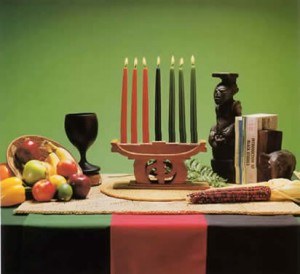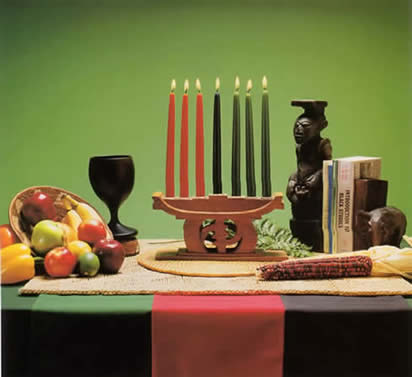 An Angolan friend once laughed when my family brought up Kwanzaa. She said it’s a term for currency where she’s from. While Kwanzaa is not an African holiday, dismissing it as another makeshift black creation ignores the positives of the celebration.
An Angolan friend once laughed when my family brought up Kwanzaa. She said it’s a term for currency where she’s from. While Kwanzaa is not an African holiday, dismissing it as another makeshift black creation ignores the positives of the celebration.
Kwanzaa is a week long celebration from December 26 to January 1 that puts a focus on African American culture. It was created by Dr. Maulana Karenga in 1966 in response to the Watts riots. The celebration consists of seven principles, which are Umoja (unity), Kujichagulia (self determination), Ujima (collective work and responsibility), Ujamaa (cooperative economics), Nia (purpose), Kuumba (creativity) and Imani (faith). Each day of Kwanzaa is dedicated to one of these principles.
Although these principles are obviously important, the significance of taking time out to discuss and reflect on them was never more evident than when my grandfather was alive. I was in 4th grade and still very much naive to the world, but the knowledge he shared, as well as my parents’ reflections on their experiences, helped open my eyes to what it means to be black in America.
My grandfather was a Panamanian immigrant and my parents grew up in South Carolina during the Civil Rights Era. When they talked about the need for unity, it was clear that it took on a different level of importance where they came from than in Oregon, where blacks are dispersed and make up a tiny percentage of the population.
Similarly, they awakened me to the importance of self determination by putting my experiences with teachers who treated me wrong into perspective. I had taken for granted the fact that teachers were making me jump through hoops and purposefully trying to deny me opportunities given to white students. My grandfather and my parents made me realize I needed to have the initiative to take advantage of education and advocate for myself because people in power were not going to give me the help they gave to other kids.
They also impressed upon me the need for collective work and responsibility, as well as cooperative economics. I had never stopped to think how supporting black businesses puts money back into the community and maintains culture. Similarly, I’d subscribed to the individualist American culture without realizing that working together is one of the few ways to get leverage when the odds are against us as black people.
These Kwanzaa discussions also imprinted upon me the value of purpose. My grandfather and my parents talked of their lives and how they couldn’t just show up to anything. They had to do their best and work as hard as they could to get everything they got in life. As I’ve found out, my life will be no different.
Back when I was young, I was into visual art so creativity was probably the easiest principle for me to grasp. Nonetheless, my grandfather and my parents taught me that I could use my creativity for more than just entertaining myself in my free time. As a writer, these lessons have become even more important today because my sense of creativity is what will separate me from others in my field.
If creativity was the easiest principle to grasp, then faith was the most difficult. I’ve never been a strong advocate for organized religion but discussions on Imani impressed upon me that believing in something helps provide the strength to continue on when facing hard times. Although I’m agnostic, I respect other people’s religions and understand that there is no reason to trash another person’s beliefs if that’s what has him/her doing good in life.
Too often, we take shortcuts in life. We want to assume we know it all if something sounds familiar. It’s not difficult to recognize that things like unity and purpose are important. However, taking opportunities to discuss these principles and soak up knowledge and perspective from different individuals should not be ignored.
Kwanzaa provides us the opportunity to enrich our minds and we should take full advantage. People use to laugh when I told them my family would exchange educational gifts like thesauruses during Kwanzaa. However, as I get older, I appreciate the gift of knowledge of self far more than any toy or video game.

Thanks Bruce for sharing your reflections about Kwanzaa and affirming that all of those conversations we have had over the years were not in vain. God is still speaking!
Nice thoughts, Bruce, and a succinct summary of the principles. Keep on writin’.
Thanks for a good article based on personal experience. Kwanzaa can be celebrated by anyone. It is good to take the time to work on those important principles.
I look forward to reading more of your writing. Best. cml
What a great reflection Bruce. Thank you for sharing this and reminding me of the importance of working together for the common good.
Bruce Iam very pride of you. you listened and then was able to reflect on what you heard. GROWTH.